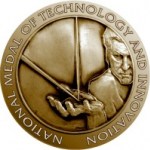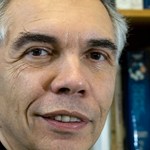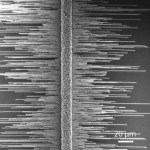Technology
by Mark Pendergrast
This is my third and final post about the state of Japan's renewable energy efforts and other measures that are vital to prevent further climate change and to wean the country from fossil fuel and nuclear power. In my first post, I covered the public-health impacts of climate change and explained why Japan is good indicator of whether countries will be able to act quickly enough in the face of these threats. Japan's reliance on imported fossil fuels gives it a good reason to invest in alternatives, and its technological sophistication should help it develop renewable-…
We kicked off the countdown to Newton's birthday with his second law of motion, which is almost but not quite everything you need to understand and predict the motion of objects. The missing piece is today's equation:
This is the full and correct definition of momentum, good for any speed all the way up to the speed of light. Newton's second law tells us how the momentum changes in response to a force, but in order to use that to predict the future, you need to know what momentum is, and that's where this equation comes in.
(Wouldn't it make more sense to do this first, and the second law…
by Elizabeth Grossman
The US may be fourth on the United Nations Development Program (UNDP) list of countries ranked by per-capita income, but persistently high unemployment has left many of this country's residents in poverty. The past year has seen a record increase in US children enrolled in free school meal programs, and the need is such that some districts are now serving not only lunch but also breakfast and dinner. In Chicago, Dallas and Newark school districts, 85 percent of children qualify for free meals, according to data analyzed by The New York Times. Given such a situation,…
This is not a manual or even a how-to blog post, but rather, what I hope to be a few helpful suggestions that may or may not have already occurred to you. I was motivated to write this because of a series of recent events in which it became obvious that a lot of people, myself included in certain instances, were not managing some of the basic information linked to their on-line identity in the best way.
Let me give you a simple example, which happens to be the first one I came across in this recent series of encounters with eInefficiency. I was working with a group of people at a non-profit…
What roles should community colleges play in training the bioeconomy workforce of the future?
Send your answers to bioeconomy@ostp.gov by Dec. 6th.
One night towards the end of October, we happened to meet with someone who could tell us more.
We asked him about a request for information (RFI) soliciting input on the bioeconomy, that some of us saw posted on the Federal Register web site.
"What could information could we provide?," We asked (a little skeptically).
"Does the Whitehouse really want our input on ways to stimulate the bioeconomy and build the bioscience workforce?"
"Yes," he…
Each year, 12 of the nation's top scientists and engineers are awarded with the nation's highest honors, America's Nobel Prize. The National Medal of Science and the National Medal of Technology and Innovation represent the highest honors for achievement in science & technology bestowed by the President of the United States.
This year scientists and engineers were honored for groundbreaking discoveries in the fields of genetics, mathematics, energy technology, rocket science, avionics, energy and imaging technologies. The laureates were honored in a presentation ceremony by President…
To do science, we need government funding. However you feel about the free market, there just isn't a way for the free market to work on basic research. It's too risky, with not enough profitability. The things I discover in lab next week will never make me rich, and I'm not aware of many Nobel winners that did their work in private industry. We need the government to pay for what we do.
And we don't cost that much. Take a look at this chart and see if you can find how much we spend on scientific discovery. Go ahead, I'll wait.
Still looking? Might want to try full screen.
There are a lot of…
David Roberts is, as usual, bang on in his latest Grist column, lamenting the pointlessness of the debate between those who insist we need more research and development before tackling climate change, and those who say we shouldn't wait. (Roberts is among the best commenters around when it comes to the social and political context of climate change.)
For the amount of attention it gets, you'd think that settling this debate is the crucial first step in developing a policy plan or a political strategy. You'd think the "enough technology" question must be answered before anyone can move forward…
Today I'll be writing a series of blogposts from the Falling Walls conference in Berlin. Each speaker is invited to discuss the ideas, inventions, and discoveries they believe will break down walls in their field.
Paul Chirik: How Modern Alchemy Can Lead to Inexpensive and Clean Technology
Professor of chemistry Paul Chirik is on a mission to turn lead into gold. Or, to be more precise, to make lead act like gold. Precious metals are instrumental to some of the most widespread and important chemical processes in our world, such as the osmium needed to synthesise fertiliser (so valuable that…
By Joe Schwarcz, Author, USASEF Expo Performer, AT&T sponsored Nifty Fifty program speaker & Director, McGill University Office for Science and Society - Montreal, QC, Canada
Thanks to chemical ingenuity we lead a colourful life. Synthetic dyes have served up a feast for the eyes but they may leave us starving for good health. Our reliance on these chemicals exposes us to a host of unnatural wavelengths that can affect our body chemistry.
Until about a hundred and fifty years ago we had no choice but to rely on natural dyes. If you wanted red, you had better know where to find a…
The USA Science & Engineering Festival is working hard to bring President Obama and the First Lady to Sneak Peek Friday on April 27, 2012, and you can help!
As most of you know, the inaugural Festival was endorsed by President Obama and received unanimous bi-partisan support of the House and Senate. To bring this same united spirit to the 2nd Festival, we are inviting The President and his family to attend Sneak Peek Friday to further ignite the support and recognition of the largest celebration of science and engineering in the nation! Will you join us in making history? Please join…
I usually don't do requests, at least not very often. As selfish as it might sound, I do this blog mainly to amuse myself, which means that I choose whatever topics interest me and write about them. Believe it or not, I'd probably still be doing this even if my readership were 1/100 of what it is. After all, I did it seven years ago before anyone had ever caught on to the glory (and ego) that is Orac. I've just been fortunate in that, for the most part, the topics that interest me enough to write about them are generally interesting enough to a bunch of people every day to read them. That…
The NSF Astronomy division is commencing a Portfolio Review process...
"Based on the FY2011 budget appropriation and the FY2012 budget request, the optimistic budget assumed in the Astro2010 recommendations is unlikely to materialize. Therefore, NSF's Division of Astronomical Sciences (AST) is commencing a Portfolio Review process. Unlike the 2006 Senior Review, which considered the future only of AST-supported facilities, this review will encompass the entire portfolio of AST-supported facilities, programs, and other activities. The goal of the review is to recommend to AST how support for…
Sociologist John Evans talks about his research on evangelical attitudes toward science. Writing for the LA Times, he says:
I recently conducted survey research comparing the most conservative of Protestants â those who identify with a conservative Protestant denomination, attend church regularly and take the Bible literally, or about 11% of the population in my analysis â with those who do not participate in any religion. The conservative Protestants are equally likely to understand scientific methods, to know scientific facts and to claim knowledge of science. They are as likely as the…
by Elizabeth Grossman
It's now ten years since the streets of lower Manhattan roiled with clouds of toxic dust and debris from the horrific events of September 11, 2001, but it was clear from discussions and presentations at the September 16 conference hosted by the New York Coalition for Occupational Safety and Health (NYCOSH) that the dust has not yet settled when it comes to issues of protecting worker and community health from environmental hazards of a disaster - nor from the ongoing impacts of 9/11. In the course of the day-long meeting held on lower Broadway a few blocks from the World…
A recent study by Prof. Ernesto Joselevich and his team, published in Science, features perfectly aligned horizontal arrays of thin, millimeter-long nanowires. We spoke with Joselevich recently to find out why he and others in the field are excited by this advance:
WSW: Your lab has produced a fair amount of innovative research in recent years. Why is this one special?
EJ: First of all, we succeeded in growing very long horizontal nanowires with exquisite control over their orientation. Because of the numerous potential uses for semiconductor nanowires, there is a lot of competition to…
Last week, Rick Perry made some factually false and deeply disturbing claims about how evolution is and ought to be taught in Texas. In the ensuing flurry of criticism (fueled by the fact that Perry simultaneously doubled down on his climate change denial), retired British biologist Richard Dawkins was invited to comment on the matter at the Washington Post's website. His piece opens by heaping bile on Perry and any political system that allows him to rise to a place of prominence, before repeating a typically Dawkinsian (somewhat florid, always passionate), but somewhat tangential defense…
John Derbyshire thinks there's a tension between liberalism and science:
liberal scientists, which is to say most scientistsâ¦are stuck in an uncomfortable philosophical fork.
Liberalism is optimistic. It is a doctrine of progress and improvement. (Why do you think they call themselves âprogressivesâ?) In this, liberalism has had the support of science, which has made so much improvement possible â banishing diseases, improving the quality and variety of our food, reducing the need for arduous labor, increasing our comfort and amusements.
The link between liberalism and science is therefore…
A physics story makes the front page of the New York Times today. Sadly, it's with the headline Laser Advances in Nuclear Fuel Stir Terror Fear. Sigh.
The key technological development, here, is that General Electric has been playing around with a laser-based isotope separation technique. This is an idea that's been around for a long time, with lots of different people working on it. GE's technology is based on an idea from some Australians back in the 1990's, and they appear to think they can scale it up to industrial scale. Predictably enough, there's a stark difference of opinion about the…
NOTE: I was on a lovely vacation for three days in Chicago over the weekend, where I visited old haunts. (Bathroom attendants? At one of my favorite pub hangouts when I lived in Lincoln Park, John Barleycorn? Handing out crappy brown paper towels? Plastering the walls there with endless rows of flat screen TVs turned continuously on sports and news? Really? Oh, the pain.) In any case, what that means is that I didn't write anything new for today (other than this introduction). I did, however, find a lovely post from over two and a half years ago to recycle and update. Remember: If you haven't…



